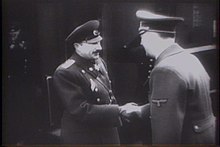
Back Холокост в България Bulgarian שואת יהודי בולגריה HE Zsidó holokauszt Bulgáriában Hungarian Հոլոքոստը Բուլղարիայում Armenian Olocausto in Bulgaria Italian په بلغاریا کې هلوکاسټ Pashto/Pushto Холокост в Болгарии Russian Holokausti në Bullgari Albanian Bulgaristan'da Holokost Turkish Голокост у Болгарії Ukrainian
This article has multiple issues. Please help improve it or discuss these issues on the talk page. (Learn how and when to remove these template messages)
|



The Holocaust in Bulgaria was the persecution of Jews between 1941 and 1944 in the Tsardom of Bulgaria and their deportation and annihilation in the Bulgarian-occupied regions of Yugoslavia and Greece during World War II, arranged by the Nazi Germany-allied government of Tsar Boris III and prime minister Bogdan Filov.[1] The persecution began in 1941 with the passing of anti-Jewish legislation and culminated in March 1943 with the detention and deportation of almost all[2] – 11,343 – of the Jews living in Bulgarian-occupied regions of Northern Greece, Yugoslav Macedonia and Pirot. These were deported by the Bulgarian authorities to Vienna and ultimately sent to extermination camps in Nazi-occupied Poland.
The deportation of the 48,000 Jews from Bulgaria proper also began at the same time but was found out and halted following the intervention of a group of government members of parliament led by Dimitar Peshev. Subsequent public protests and pressure from prominent figures persuaded the Tsar to reject further plans for the deportation.[3][4][5] Instead Sofia's 25,743 Jews[6][7] were internally deported to the countryside and had their property confiscated.[8][9][10] Jewish males between the ages of 20 and 46 were conscripted into the Labour Corps until September 1944.[11][12][10][9] The events that prevented the deportation to extermination camps of about 48,000[13] Jews in Spring 1943 are termed the "Rescue of the Bulgarian Jews". The survival rate of the Jewish population in Bulgaria as a result was one of the highest in Axis Europe.
- ^ Brustein, William I.; Brustein, Professor William (13 October 2003). Roots of Hate: Anti-Semitism in Europe Before the Holocaust. Cambridge University Press. p. 4. ISBN 978-0-521-77478-9.
- ^ Monastir During the Holocaust article from Yad Vashem
- ^ Ragaru, Nadège (19 March 2017). "Contrasting Destinies: The Plight of Bulgarian Jews and the Jews in Bulgarian-occupied Greek and Yugoslav Territories during World War Two". Online Encyclopedia of Mass Violence. Retrieved 8 March 2020.
- ^ "Factsheet of historical information regarding the Holocaust". www.worldjewishcongress.org. Shalom. Retrieved 8 March 2020.
- ^ "The Rescue of Bulgarian Jewry". aishcom. 23 October 2011. Retrieved 22 May 2015.
- ^ Did Bulgaria Save All of its Jews? article by Angel Wagenstein (in Bulgarian)
- ^ Crowe, David M. (4 May 2018). The Holocaust: Roots, History, and Aftermath. Routledge. ISBN 978-0-429-96498-5.
- ^ Sage, Steven S. (2018). "Bulgaria". In Megargee, Geoffrey P.; White, Joseph R. (eds.). The United States Holocaust Memorial Museum Encyclopedia of Camps and Ghettos, 1933–1945, Volume III: Camps and Ghettos under European Regimes Aligned with Nazi Germany. Indiana University Press. pp. 7, 10, 12. ISBN 978-0-253-02386-5.
- ^ a b "Bulgaria". United States Holocaust Memorial Museum Encyclopedia. Retrieved 6 March 2020.
- ^ a b Chary, Frederick B. (1972). The Bulgarian Jews and the final solution, 1940-1944. Pittsburgh: University of Pittsburgh Press. ISBN 9780822976011. OCLC 878136358.
- ^ Lacqueur, Walter; Baumel, Judith Tydor (2001). The Holocaust Encyclopedia. Yale University Press. pp. 98–104. ISBN 978-0-300-13811-5.
- ^ Ioanid, Radu (25 November 2010). Occupied and Satellite States. Oxford University Press. doi:10.1093/oxfordhb/9780199211869.003.0022.
- ^ Sofia: Double-Faced Bulgaria Civil Society and the Holocaust: International Perspectives on Resistance and Rescue
© MMXXIII Rich X Search. We shall prevail. All rights reserved. Rich X Search